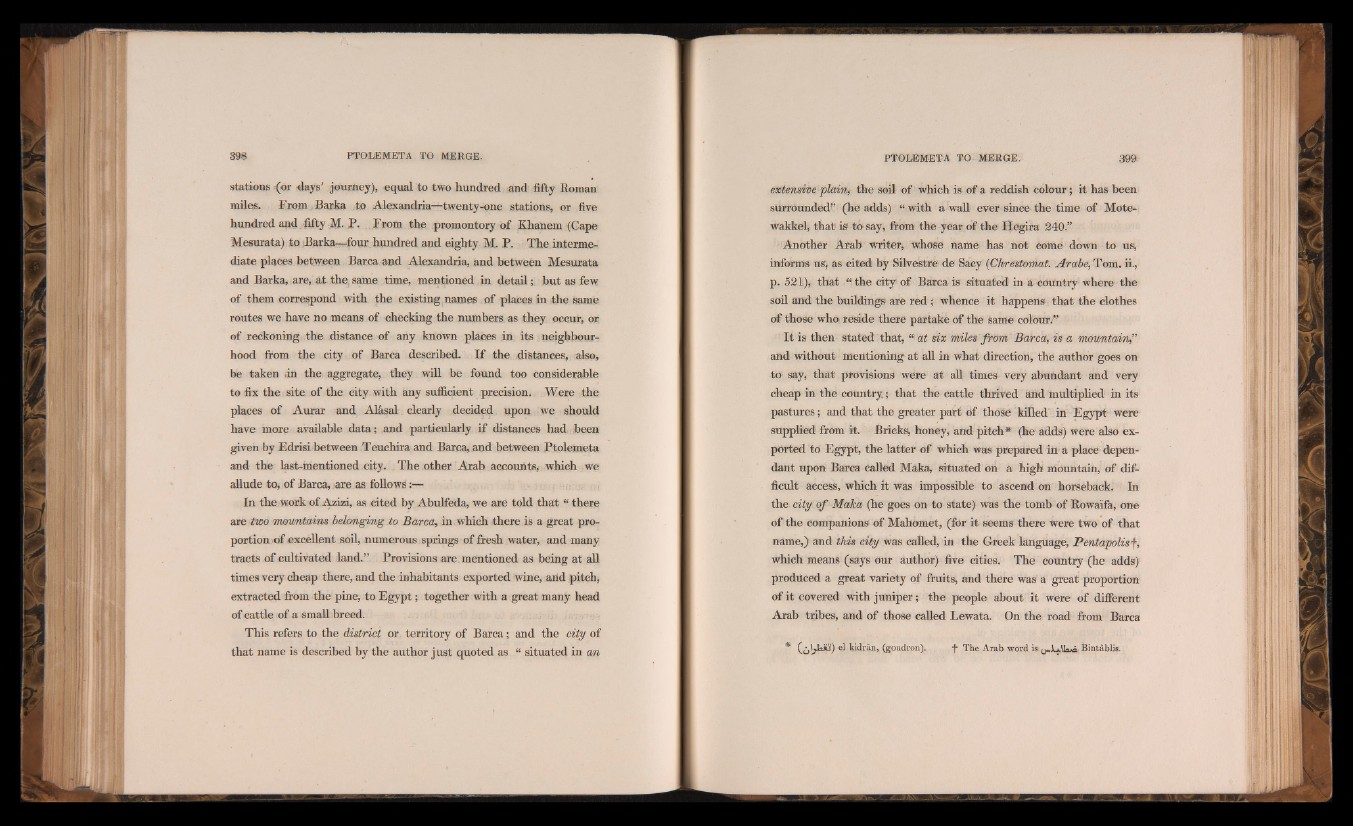
stations (or days' journey), equal to two hundred and fifty Koman
miles. From Hark# to Alexandria—twenty-one stations, or five
hundred and fifty M. F. From the promontory of Khanem (Gape
Mesurata) to ,Barka—four hundred and eighty M. P. The intermediate
places between Barcaand Alexandria, and between Mesurata
and Barka, are, at the, same time, mentioned in d e t a i lb u t as few
of them correspond with the existing names of places in the same
routes we have no means of checking the numbers as they occur, or
of reckoning the distance of any known places in its neighbourhood
from the city of Barca described. If the distances, also,
be taken in the aggregate, they will be found too considerable
to fix the site of the city with any sufficient precision. Were the,
places of Aurar and Alasal clearly decided upon, we should
have more available data; and particularly if distances had been
given by Edrisi between Teuchira and Barca, and between Ptolemeta
and the last-mentioned city. The other Arab accounts, which we
allude to, of Barca, are as follows:—
In the, work of Aziaa, as cited by Abulfeda, we are told that “ there
see two moimbains belonging to Barca, in which there is a great proportion
of .excellent soil, numerous springs of fresh water, and many
tracts of cultivated land.” Provisions are mentioned as being at all
times very cheap there, and the inhabitants exported wine, and pitch,
extracted from the pine, to Egypt; together with a great many head
of cattle of a small breed.
This refers to the district or, territory of Barca; and the city of
that name is described by the author just quoted as I situated in an
extensive plain, the soil of which is of a reddish colour; it has been
surrounded” (he adds) “ with a wall ever since the time of Mote-
wakkel, that is to say, from the year of the Hegira 240.”
Another Arab writer, whose name has not come down to us,
informs us, as cited by Silvestre de Saey (Chrestoniat. Arabe, Tom. ii.,
p. 521), that “ the city of Barca is situated in a country where the
soil and the buildings are red ; whence it happens that the clothes
of those who reride there partake of the same colour.”
I t is then stated that, “ at six miles from Barca, is a mountain,”
and without mentioning at all in what direction, the author goes on
to say, that provisions were at all times very abundant and very
cheap in the country, j that the cattle thrived and multiplied in its
pastures; and that the greater part of thoSe killed in Egypt' were
supplied from it. Bricks, honey, and pitch* (be adds) were also exported
to Egypt, the latter of which was prepared in a place dependant
upon Barca called Maka, situated on a high mountain, of difficult
access, which it was impossible to ascend on horseback. In
the city qf Maka (he goes on to state) was the tomb of Rowaifa, one
of the companions of Mahomet, (for it seems there were two of that
name,} and this city was called, in the Greek language, PentapoliS’f,
which means (says our author) five cities. The country (he adds)
produced a great variety of fruits, and there was a great proportion
of it covered with juniper f the people about it were of different
Arab tribes, and of those called Lewata. On the road from Barca
* (¿IjLiiS) el kidran, (goudron). *f* The Arab word is Bintablis.